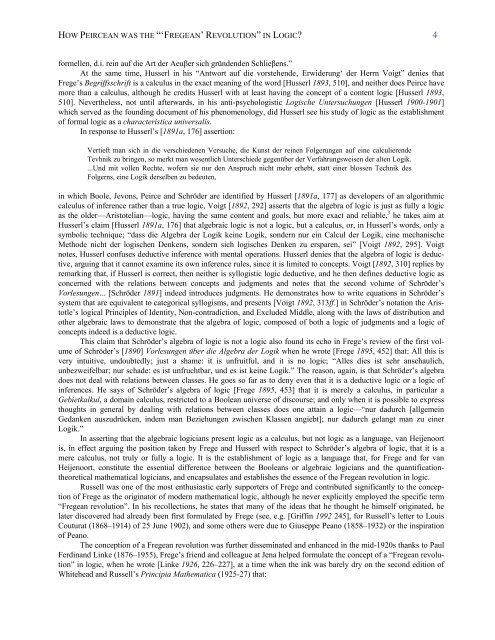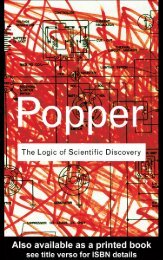Create successful ePaper yourself
Turn your PDF publications into a flip-book with our unique Google optimized e-Paper software.
HOW PEIRCEAN WAS THE “‘FREGEAN’ REVOLUTION” IN LOGIC? 4<br />
formellen, d.i. rein auf die Art der Aeuβer sich gründenden Schlieβens.”<br />
At the same time, Husserl in his “Antwort auf die vorstehende‚ Erwiderung‘ der Herrn Voigt” denies that<br />
Frege’s Begriffsschrift is a calculus in the exact meaning of the word [Husserl 1893, 510], and neither does Peirce have<br />
more than a calculus, although he credits Husserl with at least having the concept of a content logic [Husserl 1893,<br />
510]. Nevertheless, not until afterwards, in his anti-psychologistic Logische Untersuchungen [Husserl 1900-1901]<br />
which served as the founding document of his phenomenology, did Husserl see his study of logic as the establishment<br />
of formal logic as a characteristica universalis.<br />
In response to Husserl’s [1891a, 176] assertion:<br />
Vertieft man sich in die verschiedenen Versuche, die Kunst der reinen Folgerungen auf eine calculierende<br />
Tevhnik zu bringen, so merkt man wesentlich Unterschiede gegenüber der Verfahrungsweisen der alten Logik.<br />
...Und mit vollen Rechte, wofern sie nur den Anspruch nicht mehr erhebt, statt einer blossen Technik des<br />
Folgerns, eine Logik derselben zu bedeuten,<br />
in which Boole, Jevons, Peirce and Schröder are identified by Husserl [1891a, 177] as developers of an algorithmic<br />
calculus of inference rather than a true logic, Voigt [1892, 292] asserts that the algebra of logic is just as fully a logic<br />
as the older—Aristotelian—logic, having the same content and goals, but more exact and reliable, 3 he takes aim at<br />
Husserl’s claim [Husserl 1891a, 176] that algebraic logic is not a logic, but a calculus, or, in Husserl’s words, only a<br />
symbolic technique; “dass die Algebra der Logik keine Logik, sondern nur ein Calcul der Logik, eine mechanische<br />
Methode nicht der logischen Denkens, sondern sich logisches Denken zu ersparen, sei” [Voigt 1892, 295]. Voigt<br />
notes, Husserl confuses deductive inference with mental operations. Husserl denies that the algebra of logic is deductive,<br />
arguing that it cannot examine its own inference rules, since it is limited to concepts. Voigt [1892, 310] replies by<br />
remarking that, if Husserl is correct, then neither is syllogistic logic deductive, and he then defines deductive logic as<br />
concerned with the relations between concepts and judgments and notes that the second volume of Schröder’s<br />
Vorlesungen… [Schröder 1891] indeed introduces judgments. He demonstrates how to write equations in Schröder’s<br />
system that are equivalent to categorical syllogisms, and presents [Voigt 1892, 313ff.] in Schröder’s notation the Aristotle’s<br />
logical Principles of Identity, Non-contradiction, and Excluded Middle, along with the laws of distribution and<br />
other algebraic laws to demonstrate that the algebra of logic, composed of both a logic of judgments and a logic of<br />
concepts indeed is a deductive logic.<br />
This claim that Schröder’s algebra of logic is not a logic also found its echo in Frege’s review of the first volume<br />
of Schröder’s [1890] Vorlesungen über die Algebra der Logik when he wrote [Frege 1895, 452] that: All this is<br />
very intuitive, undoubtedly; just a shame: it is unfruitful, and it is no logic; “Alles dies ist sehr anschaulich,<br />
unbezweifelbar; nur schade: es ist unfruchtbar, und es ist keine Logik.” The reason, again, is that Schröder’s algebra<br />
does not deal with relations between classes. He goes so far as to deny even that it is a deductive logic or a logic of<br />
inferences. He says of Schröder’s algebra of logic [Frege 1895, 453] that it is merely a calculus, in particular a<br />
Gebietkalkul, a domain calculus, restricted to a Boolean universe of discourse; and only when it is possible to express<br />
thoughts in general by dealing with relations between classes does one attain a logic—“nur dadurch [allgemein<br />
Gedanken auszudrücken, indem man Beziehungen zwischen Klassen angiebt]; nur dadurch gelangt man zu einer<br />
Logik.”<br />
In asserting that the algebraic logicians present logic as a calculus, but not logic as a language, van Heijenoort<br />
is, in effect arguing the position taken by Frege and Husserl with respect to Schröder’s algebra of logic, that it is a<br />
mere calculus, not truly or fully a logic. It is the establishment of logic as a language that, for Frege and for van<br />
Heijenoort, constitute the essential difference between the Booleans or algebraic logicians and the quantificationtheoretical<br />
mathematical logicians, and encapsulates and establishes the essence of the Fregean <strong>revolu</strong>tion in logic.<br />
Russell was one of the most enthusiastic early supporters of Frege and contributed significantly to the conception<br />
of Frege as the originator of modern mathematical logic, although he never explicitly employed the specific term<br />
“Fregean <strong>revolu</strong>tion”. In his recollections, he states that many of the ideas that he thought he himself originated, he<br />
later discovered had already been first formulated by Frege (see, e.g. [Griffin 1992 245], for Russell’s letter to Louis<br />
Couturat (1868–1914) of 25 June 1902), and some others were due to Giuseppe Peano (1858–1932) or the inspiration<br />
of Peano.<br />
The conception of a Fregean <strong>revolu</strong>tion was further disseminated and enhanced in the mid-1920s thanks to Paul<br />
Ferdinand Linke (1876–1955), Frege’s friend and colleague at Jena helped formulate the concept of a “Fregean <strong>revolu</strong>tion”<br />
in logic, when he wrote [Linke 1926, 226–227], at a time when the ink was barely dry on the second edition of<br />
Whitehead and Russell’s Principia Mathematica (1925-27) that:





